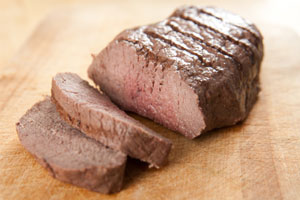It’s been called the Caveman diet, the Paleolithic diet, the Darwinian diet, and a whole slough of others pre-historic names. But however you may refer to it, the paleo diet is gaining momentum and not just in the diet and health realm, but in the medical realm as well.
For those unfamiliar with the paleo diet, it mimics the habits of our ancestors 10,000 years before us who were primarily hunter-gathers. Historians propose they lived off the land, consuming mostly animal meat and any fruits and vegetables they may be able to forage.
For followers of the paleo diet, that means eating a lot of meat and produce and absolutely no sugar, dairy, grains and beans. This sometimes extreme way of eating – and living – obviously isn’t for everyone. But proponents of the diet remain that it works, it makes sense, and it’s worth sharing.
One such proponent is Loren Cordain, a professor at Colorado State University, who holds a doctorate in exercise science. Cordain is also the author of the book paleo eaters swoon over: The Paleo Diet.
Now that Cordain has informed the general public about why he believes the paleo diet to be a superior way of eating in his book, he’s ready to share this wealth of knowledge with the medical field as well, which is why he recently co-founded the Paleo Physicians Network.
The network’s goal is to connect consumers with medical professionals who practice “Darwinian/Evolutionary Medicine.” And somewhat surprisingly, hundreds of physicians have already joined, with 53 residing in California alone.
But as with any new health or diet movement, there needs to be science to back it up. And even founders of the paleo movement will admit that there isn’t any concrete evidence backing their views; it’s all personal opinion and research. According to a recent article from NPR, no one technically practices evolutionary medicine because at this point, it’s only a theory.
Randolph Nesse, a psychiatry and psychology professor at the University of Michigan, is considered by some to be the father of evolutionary medicine. This is in part due to an article he co-authored in 1991 called “The Dawn of Darwinian Medicine,” which essentially proposed more research needs to be done on how evolution by natural selection can determine what makes us ill.
But Nesse is quick to clarify that he’s not a big fan of the Paleo Physicians Network because there’s still much research to be done to back the theories they’re basing their medicinal practices on. “Doctors know very little about evolution,” he said, “so I would like to distance evolutionary medicine from any direct application in the clinic until we can do some real trials.”
Still, others insist that evolutionary medicine has a place in our world, such as physician Lane Sebring who belongs to the Paleo Physicians Network and has been using this type of medicine to treat such serious conditions as heart disease and diabetes in his clinic for more than 12 years now. And his primary reason for doing so? He believes modern medicine has failed many people, and so he instead coaches patients on what kind of exercise and diet is best for human beings, and what types of foods our bodies are programmed for.
While the Paleo Physicians Network has completed a few small clinical trials with positive results, more work still needs to be done. But regardless of whether or not the network has everyone’s support, one can’t deny that the paleo movement continues to make strides as more and more people join the caveman way.
Also Read:
Make it Paleo: Couples Share Thoughts on Primal Eating
Living Like a Caveman in New York City
The Paleo Diet: Were Cavemen the Picture of Health?
